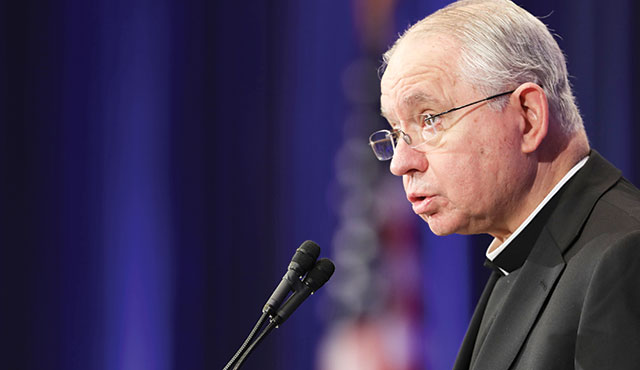BALTIMORE (CNS) — Archbishop Jose H. Gomez of Los Angeles was elected to a three-year term as president of the U.S. Conference of Catholic Bishops during the bishops’ fall general assembly in Baltimore.
The native of Mexico was chosen Nov. 12 with 176 votes from a slate of 10 nominees.
Archbishop Gomez, 67, is the first Latino to be elected president. He has served as conference vice president for the past three years, working alongside Cardinal Daniel N. DiNardo of Galveston-Houston, the outgoing president. His term as president begins when the assembly ends.
The Los Angeles prelate has been a leading advocate of immigrant rights, often voicing support for newcomers as they face growing restrictions being implemented by the Department of Homeland Security and other federal agencies.
In subsequent voting, Archbishop Allen H. Vigneron of Detroit was elected conference vice president. He was elected on the third ballot by 151-90 in a runoff with Archbishop Timothy P. Broglio of the U.S. Archdiocese for the Military Services.
Under USCCB bylaws, after the election for president, the vice president is elected from the remaining nine candidates.
The two top officers begin their terms at the conclusion of the fall assembly Nov. 13.
In other areas, the conference voted overwhelmingly Nov. 11 in Baltimore on a revised set of strategic priorities to take them into the next decade.
The vote was 214-4 to adopt the new set of strategic priorities and plans for 2021-24, with two abstentions. It was the first vote recorded during the U.S. Conference of Catholic Bishops’ fall general meeting.
Before the vote, the document was presented to the body of bishops by Archbishop Allen H. Vigneron of Detroit, chairman of the USCCB Committee on Priorities and Plans.
When they met in June, the bishops gave their provisional OK to development of a new set of strategic priorities for 2021-24. The June vote allowed committees, secretariats and departments of the USCCB to continue work on how to carry out the priorities.
The expectation is that the 2021-24 priorities would be implemented at the USCCB’s November 2020 meeting.
For this year’s vote, a simple of majority of bishops present and voting was needed for passage.
A working group of bishops under the aegis of the USCCB Committee on Priorities and Plans — following two rounds of consultations with the bishops, one round with the USCCB’s National Advisory Council, with recent input from five USCCB standing committees — identified four priorities:
Since June, the wording was tweaked slightly for one of the priorities. For “Evangelization: Form a joyful band of missionary disciples of Jesus Christ,” the phrase “of Jesus Christ” is new.
The other three priorities are: “Life and dignity of the human person: Serve the common good as the leaven in a free society”; “Protect and heal God’s children: Restore integrity, foster virtue”; and “Vocations: Equip all Christ’s disciples for mission.”
According to USCCB statutes, their strategic plan is to be reviewed and revised as needed every four years.
The process got under way during the USCCB fall general meeting last November, where bishops in their regional meetings were asked to give input on strategic priorities for 2021-24, and an electronic survey distributed to bishops last January.
Included in the document on the priorities was a message from Archbishop Vigneron to his fellow bishops — he used all-caps to make his case that one priority was not more important than the other.
The revised priorities “are not listed in priority order. It follows then that any inference of prioritization is neither intended or supported by basis of fact,” he said. “Instead, the listed order of strategic priorities and emphasis areas serves only to provide a framework for referencing them in committee, subcommittee and department operational plans and in future evaluations.”
With the approval of the priorities and plans, USCCB committees, secretariats and departments will continue developing draft operational plans; that work started in July. Starting in February through June 2020, the Committee on Priorities and Plans and the USCCB general secretariat will conduct a review of the draft strategic plan.
USCCB Executive Committee review and approval will take place between July and September 2020. In November 2020, the full USCCB will conduct a vote on whether to approve the 2021-24 priorities.

